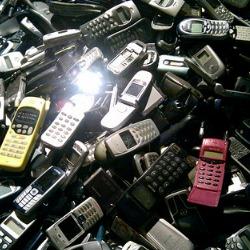BROOKE GLADSTONE: So how should reporters, and sources, manage secret information, when we all must use communication tools that have no legal privacy protection? Nick Weaver is a senior researcher at the International Computer Science Institute in Berkeley, California. He wrote a piece for Wired this week titled, “Hear Ye, Future Deep Throats: This Is How to Leak to the Press.”
NICHOLAS WEAVER: You have to buy a new computer because your existing computer has so many things that track you. You go to some network café for from your house, walk because well we have license plate readers now, open up the computer, create a new email account, email to the press. Turn off the Wi-Fi on the computer, clear all the browser cookies, close the computer. And now, this computer you only use to contact the press, only from locations far from home.
BROOKE GLADSTONE: Okay, tell me how you deal with the phone.
NICHOLAS WEAVER: Probably the best solution is what Julia Angwin of the Wall Street Journal suggested to me. Go to some random liquor in a bad neighborhood.
BROOKE GLADSTONE: Why a bad neighborhood?
NICHOLAS WEAVER: You want bad surveillance cameras. A liquor store has a old camera. The VHS tape gets recorded over every day.
BROOKE GLADSTONE: You also suggest that people pay cash.
NICHOLAS WEAVER: Of course. Credit cards are traceable. Buy a couple of disposable cell phones. Turn them off and keep them off. One is for you, one you mail to the press. At a time, written on the phone, you call the press, from a location far from your home, far from where you work. Talk what you need to do and then when you’re done, you destroy your cell phone and throw it away.
BROOKE GLADSTONE: So how would you arrange for future meetings?
NICHOLAS WEAVER: Oftentimes, you can just meet over the phone. As long as you're in a remote location and you keep the phone off at all other times, that phone can't be traced to you. BROOKE GLADSTONE: Dealing with cell phones and computers, these are all 21st century solutions to 21st century problems. But, as you note in your piece, there are old school solutions, as well. NICHOLAS WEAVER: The US Mail is an excellent form of one-way communication. They don't record everything. If they’re monitoring the recipient, even then they can only say this was sent from Berkeley or sent from Washington, DC.
BROOKE GLADSTONE: How about even older school, talking face to face. It's easy for cameras to pick up license plate numbers, but there are also face recognition cameras.
NICHOLAS WEAVER: Face recognition is actually much harder than license plate recognition and easy to screw up; just wear a hat.
BROOKE GLADSTONE: [LAUGHS] So the US Mail, talking face to face, walking! Aren’t they really going to slow down investigative journalism?
NICHOLAS WEAVER: I think that is the point. We've had two administrations that view 1984 as an operations manual. This acts to dissuade future leakers.
BROOKE GLADSTONE: 1984? Aren’t you a little overwrought?
NICHOLAS WEAVER: The surveillance apparatus that we've created in private industry would make Orwell ashamed. Companies you've never heard of are recording everything you do all data that is just a subpoena away.
BROOKE GLADSTONE: Nick, thank you very much.
NICHOLAS WEAVER: Thank you very much for having me.
BROOKE GLADSTONE: Nick Weaver is a senior researcher at the International Computer Science Institute in Berkeley, California.
